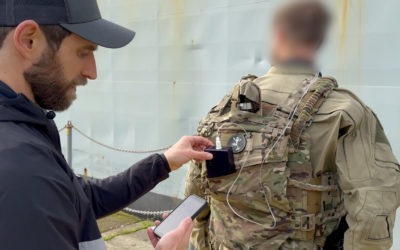Breathing: Your Overlooked Superpower
You’re in the field, deep in a high-stakes operation. The pressure is intense, your heart’s racing, and the decisions you make in the next few moments could define success—or failure.
In these moments, what if there was a way to restore calm? To stay sharp, focused, and in control—using a tool you already have?
For Special Operations Forces (SOF) Operators, success goes beyond physical strength or mental grit. It’s about maintaining peak performance under relentless stress. That’s why we developed the Performance Breathing System® (PBS) —a pioneering approach to mastering breathing, and optimising performance in the toughest environments.
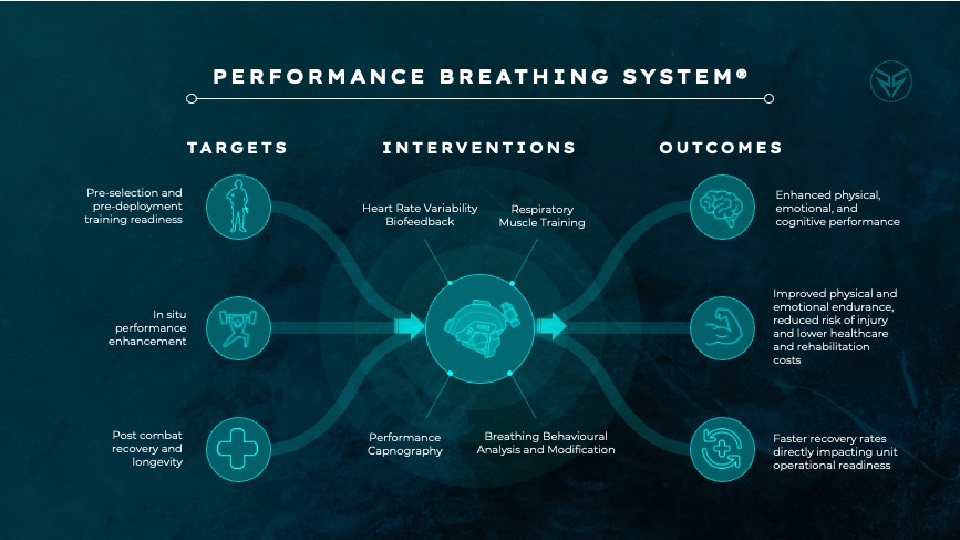
The Demands of SOF Operations
Being an SOF Operator is not your average job. These elite professionals operate in some of the harshest, most unpredictable environments imaginable. The demands they face can lead to:
- Fatigue and burnout, which reduce effectiveness during missions.
- Slower reaction times and increased decision-making errors.
- Cognitive impairments caused by sustained stress levels.
Many of these challenges are amplified by something often overlooked—dysfunctional breathing patterns. Pain, trauma, poor posture, and repetitive motion can disrupt breathing patterns. And when breathing is suboptimal, it disrupts the body’s chemical balance, leading to:
- Weak coordination and motor skills.
- Slower cognitive processes.
- Amplified emotional stress responses.
Breathing isn’t just about staying alive—it’s the foundation for physical and mental performance.
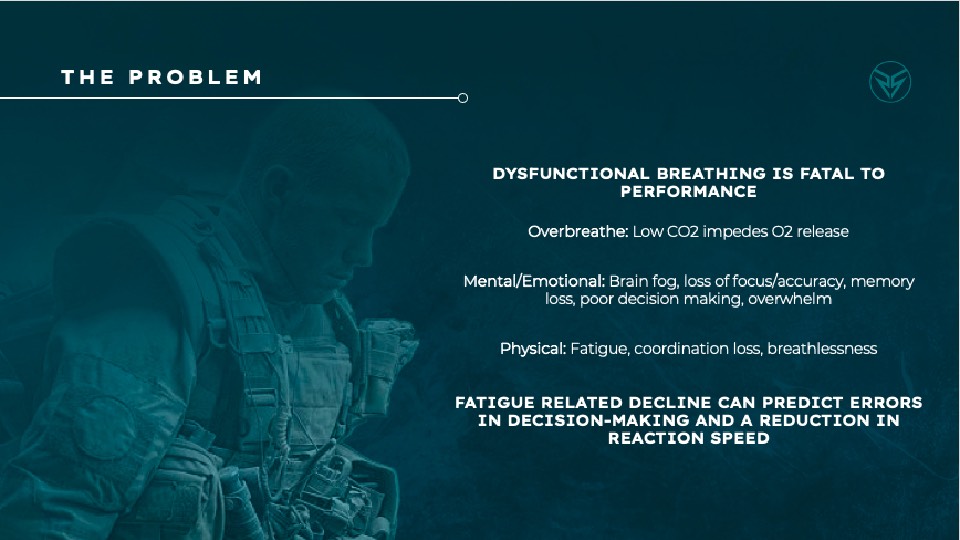
Why Breathing Is the Key to Peak Performance
We often think of breathing as automatic, but how you breathe influences your body’s entire chemical balance. Dysfunctional breathing throws this off, leading to:
- Weakened motor skills: Reduced coordination during high-pressure scenarios.
- Slower cognition: A drop in decision-making and problem-solving abilities.
- Increased stress: Emotional responses become harder to control.
The Performance Breathing System® addresses these issues by first building self-awareness of how SOF Operators have learned to breathe under pressure and operational fatigue. During our training Operators develop a deeper understanding of their unique physiological responses and learned breathing habits within the context they need to perform.
Most breathing patterns are developed unconsciously, shaped by experiences and the stressors we encounter throughout our lives. When faced with high-pressure situations, Operators may instinctively revert to these primal responses, which can manifest as dysfunctional breathing habits that compromise performance. By harnessing self-awareness, Operators can identify how their learned breathing behaviours are influenced by their unique reflexive responses, enabling them to consciously shape optimal behaviours through deliberate practice. They also learn what they can do when things go wrong, which they inevitably will do in high stress, high consequence occupations.
Mastery of breathing behaviour allows Operators to gain a level of unconscious automaticity (unconscious competence), the ultimate goal in performance. The fastest behaviour is the one that’s automatic. If an Operator has to think about their breathing in moments of high stress, high consequence, this will compete with attention and therefore skill execution. Developing trust in their physiological responses is key to enhancing decision-making and overall effectiveness. Training shapes behaviour, behaviour shapes outcomes.
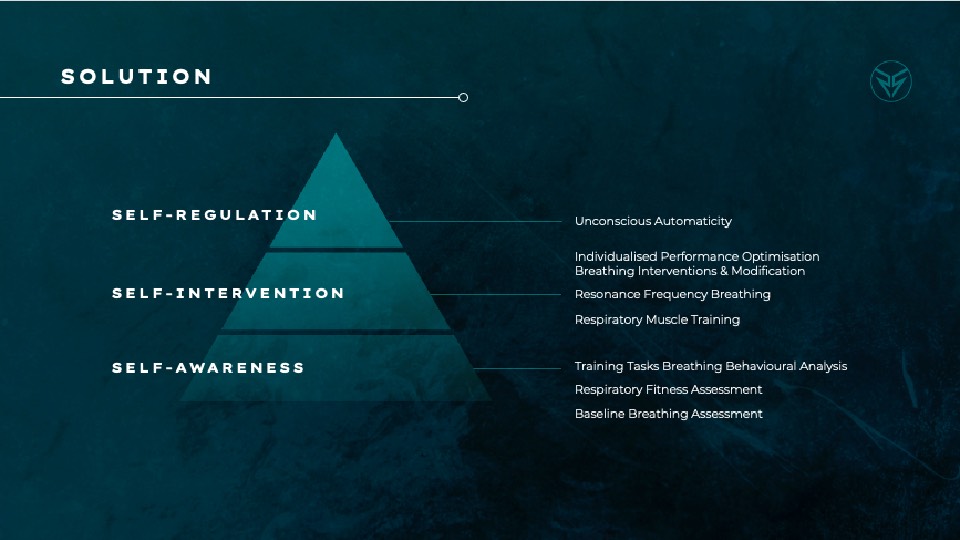
What Is the Performance Breathing System?
The Performance Breathing System® is a data-driven, evidence-based programme tailored for SOF Operators. It combines cutting-edge biometrics, wearable technology, and practical breathing behavioural analysis and modification to optimise how operators perform under pressure.
Operators learn to:
- Build functional and optimal breathing habits at rest, during exertion, and in cognitively demanding scenarios.
- Use real-time biofeedback to monitor breathing efficiency, CO₂ levels, heart rate variability, and more.
- Implement breathing interventions that optimise recovery from exertion, stress management, cognitive enhancement, and emotional regulation.
It’s designed to address the unique challenges of SOF missions by integrating advanced technology with personalised, mission-specific training.
Real-World Benefits of PBS Training
For SOF Operators:
PBS is about delivering results where they matter most—on the ground. Operators gain:
- Real-time performance tools: Understanding individualised breathing behaviour to stay focused and resilient, even in high-stress situations.
- Advanced insights: Wearable tech provides data on physiological readiness and identifies areas for improvement.
- Mission-specific training: Tailored interventions for regulating fatigue, improving emotional control, and making split-second decisions.
- Simulated combat preparation: PBS skills are tested in realistic scenarios to ensure operators can perform under pressure.
- Sustainable benefits: Once mastered, functional breathing habits become second nature.
For Human Performance (HP) Staff:
PBS also equips HP professionals with the tools to support their teams:
- Screen and assess breathing patterns: Identify and address dysfunctional breathing quickly and effectively.
- Professional development: Stay ahead of the curve with the latest breathing science and technologies.
- Cost-effective solutions: Provide immediate, evidence-based breathing interventions that require minimal upkeep.
The Science Behind PBS: Why It Works
Breathing is far more than just taking in oxygen; it’s a critical regulator of the body’s chemical and physiological balance. Every breath influences:
- CO₂ and O₂ balance: Optimal breathing ensures the right levels of carbon dioxide (CO₂) and oxygen in the blood, which is essential for efficient energy production and cognitive performance. Dysfunctional breathing can disrupt this balance, leading to fatigue, brain fog and poor decision making.
- Heart rate variability (HRV): Conscious breathing intervention such as Resonance Frequency Breathing (RFB), activates the vagus nerve, directly improving HRV—a key marker of stress resilience and recovery. A higher HRV is linked to better focus, faster reaction times, and improved emotional regulation.
- Acid-base balance: Breathing regulates the body’s pH levels, ensuring metabolic stability even under extreme physical exertion or mental stress.
Through PBS, operators learn to harness these physiological processes for improved performance. By using biofeedback and wearable technology, PBS aligns applied breathing science with the unique demands of SOF operations. Operators can measure their physiological baselines, identify stress triggers, and adapt in real time. It’s a new frontier of HPO for those who need to perform at their peak.
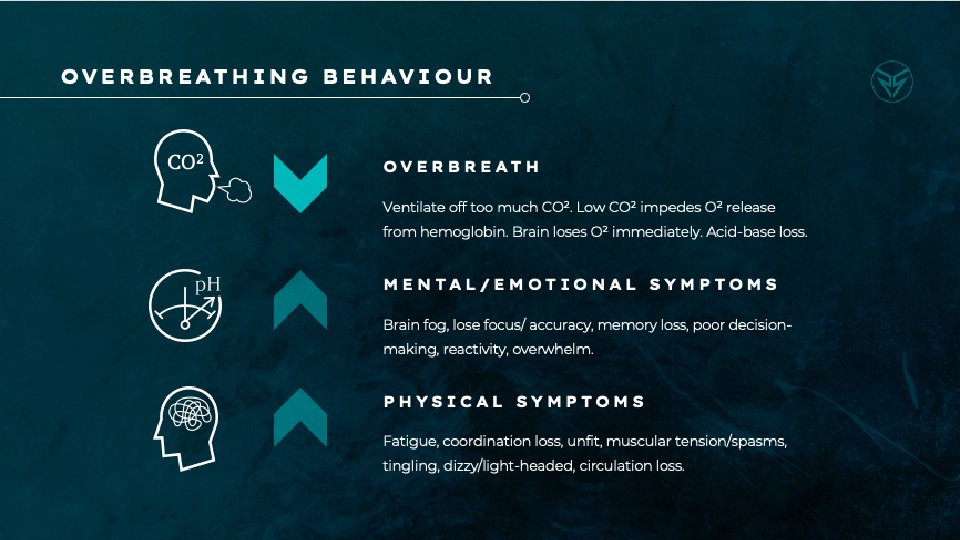
PBS in Action: Training Options
PBS is flexible and designed to meet the needs of both SOF Operators and embedded HP teams:
- SOF Operator Course: A 2- or 3-day programme for operators, focusing on education, assessments and mission-specific breathing behavioural analysis and modification.
- Train-the-Trainer (TTT) Course: A 2-day programme for HP staff, covering foundational applied breathing science, screening methods, and real-time interventions.
Both courses deliver practical tools that participants can implement immediately—offering benefits that last far beyond the training sessions.

